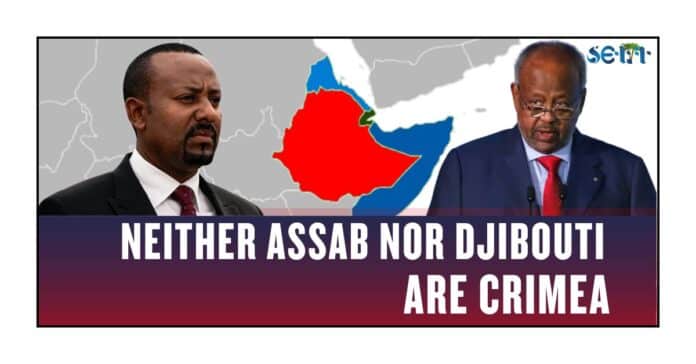In a powerful and unambiguous interview with Jeune Afrique, Djibouti’s President Ismaïl Omar Guelleh delivered his strongest message yet to Ethiopian Prime Minister Abiy Ahmed, bluntly rejecting any notion of seaport acquisition by force or coercion. Referring to the Ethiopian PM’s recent assertions, President Guelleh declared: “Djibouti is not Crimea.” The statement resonated widely across the region and internationally, reflecting growing alarm over Ethiopia’s escalating rhetoric regarding sovereign access to the Red Sea.
For nearly two years, Prime Minister Abiy has intensified a campaign pushing Ethiopia’s need for a seaport of its own, repeatedly stating that his country must gain maritime access “by any means necessary.” These remarks, perceived as veiled threats, have sparked regional unease, drawing sharp rebukes from neighboring states who view them as a direct challenge to their sovereignty and territorial integrity. The situation has become particularly concerning given Ethiopia’s history of regional conflict and internal unrest.
This assertive posture has led to a series of diplomatic setbacks for Ethiopia. Neighboring countries, including Eritrea, Djibouti, and Somalia, have responded with strong warnings, asserting that any infringement on their borders will be met with a strong response. These tensions risk plunging the already volatile Horn of Africa into further instability.
What compounds the danger is the growing belief that foreign actors are fueling Ethiopia’s aggressive stance. Reports and public statements from senior Ethiopian officials, including Getachew Reda — a key adviser on East African affairs — have indicated that preparations for conflict with Eritrea may be influenced, or even dictated, by external powers with vested interests in the Red Sea corridor. Such influence not only undermines Ethiopian sovereignty but poses a broader threat to peace and cooperation across the region.
Among the primary targets of Ethiopia’s maritime ambitions is the Eritrean port city of Assab. Located strategically on the Red Sea, Assab has frequently featured in speculative discussions about access corridors and military arrangements. But just as President Guelleh made clear that Djibouti is not Crimea, the international community must also recognize that Assab is not a disputed zone. It is sovereign Eritrean territory — full stop. Any attempt to seize it or force Eritrea into a concession would be a blatant violation of international law.
In this context, the silence of the United Nations and the African Union has become increasingly untenable. These institutions, both charged with upholding peace and the integrity of state boundaries, must break their silence and unequivocally condemn any rhetoric or actions aimed at redrawing borders through coercion or military might.
The crisis in the Horn of Africa is not theoretical. The region is already burdened with humanitarian crises, fragile states, and unresolved conflicts. Further destabilization over sea access would be catastrophic.
The message is clear: Neither Assab nor Djibouti are Crimea. The era of colonial-style land grabs must remain in the past. Peace, sovereignty, and regional cooperation should be the cornerstones of 21st-century diplomacy. Anything less is a recipe for chaos.

